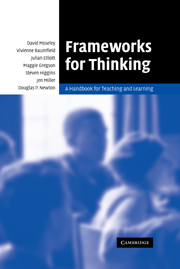Book contents
- Frontmatter
- Contents
- List of figures
- List of tables
- Notes on authors
- Foreword
- Acknowledgments
- Introduction
- 1 The nature of thinking and thinking skills
- 2 Lists, inventories, groups, taxonomies and frameworks
- 3 Frameworks dealing with instructional design
- 4 Frameworks dealing with productive thinking
- 5 Frameworks dealing with cognitive structure and/or development
- 6 Seven ‘all-embracing’ frameworks
- 7 Moving from understanding to productive thinking: implications for practice
- References
- Index
2 - Lists, inventories, groups, taxonomies and frameworks
Published online by Cambridge University Press: 22 September 2009
- Frontmatter
- Contents
- List of figures
- List of tables
- Notes on authors
- Foreword
- Acknowledgments
- Introduction
- 1 The nature of thinking and thinking skills
- 2 Lists, inventories, groups, taxonomies and frameworks
- 3 Frameworks dealing with instructional design
- 4 Frameworks dealing with productive thinking
- 5 Frameworks dealing with cognitive structure and/or development
- 6 Seven ‘all-embracing’ frameworks
- 7 Moving from understanding to productive thinking: implications for practice
- References
- Index
Summary
Bringing order to chaos
The world presents us with a confusion of objects. We seem inclined to order these objects according to their similarities. So, for instance, we divide people into men and women; events into past, present and future; and cutlery into knives, forks and spoons. Organising the world like this reduces its complexity, enables a more parsimonious description of it, and reduces the burden of thought to what can be managed.
Organising the world's objects may be something we are inclined to do, but objects can be organised in a variety of ways. Cutlery, for instance, can be sorted into plastic, metal and wooden items, long and short items, or knives, forks and spoons. Which is best? The answer, of course, depends on what you want to do. If you want to turn a hot coal, the first would be relevant; if you want to prise the lid from a can, the second would apply; if you want to eat dinner, the last would be appropriate. In other words, organisation and purpose go hand-in-hand (Bailey, 1994). An organisation that helps you do what you want is useful and can have survival value.
Here, we are concerned with kinds of thinking and how they have been organised. A particular aim is to assess the potential of these organisations for supporting thought about thinking, especially amongst those who want students to develop some proficiency in thinking.
Information
- Type
- Chapter
- Information
- Frameworks for ThinkingA Handbook for Teaching and Learning, pp. 33 - 43Publisher: Cambridge University PressPrint publication year: 2005
